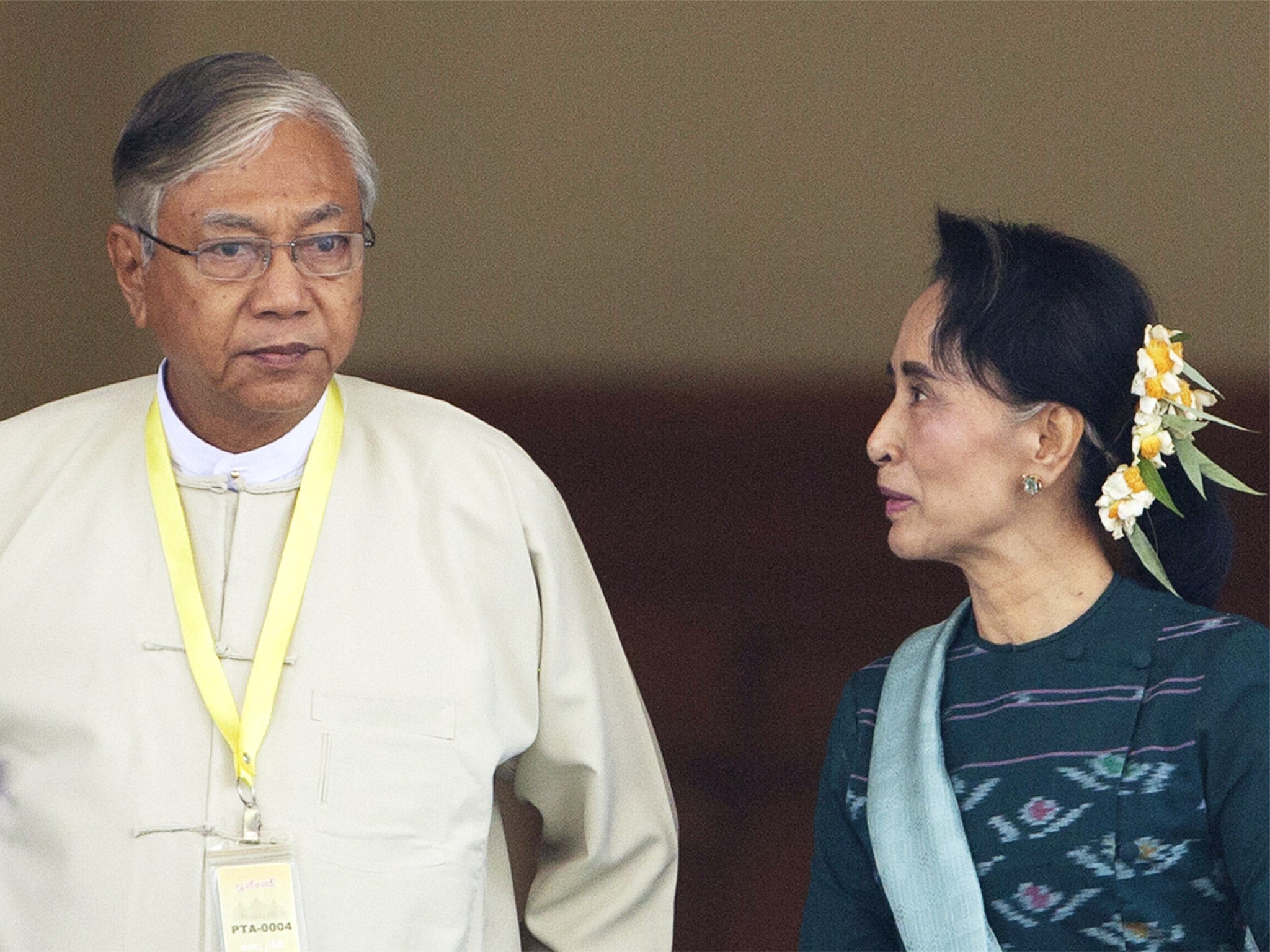Aung San Suu Kyi has a proxy president in place and now must balance demands of her military and people
It is essential that the incoming NLD government takes advantage of the fair wind from the electorate

Your support helps us to tell the story
From reproductive rights to climate change to Big Tech, The Independent is on the ground when the story is developing. Whether it's investigating the financials of Elon Musk's pro-Trump PAC or producing our latest documentary, 'The A Word', which shines a light on the American women fighting for reproductive rights, we know how important it is to parse out the facts from the messaging.
At such a critical moment in US history, we need reporters on the ground. Your donation allows us to keep sending journalists to speak to both sides of the story.
The Independent is trusted by Americans across the entire political spectrum. And unlike many other quality news outlets, we choose not to lock Americans out of our reporting and analysis with paywalls. We believe quality journalism should be available to everyone, paid for by those who can afford it.
Your support makes all the difference.With the election of a civilian President, Burma’s slow march towards real democracy takes a decisive step. True, Htin Kyaw had never been elected to anything in his life before yesterday’s triumph, and until last week he was unknown outside a small circle. The only reason he will take over at the end of the month as Burma’s Executive President is because his close friend, Aung San Suu Kyi, whom he has known since they were at school together, is barred by the constitution from doing so, and she picked him to be her proxy. Before November’s general election, she made it clear that if her party, the National League for Democracy (NLD), won and she was unable to persuade the outgoing government to amend the constitution, she would rule anyway, “above the president”. That is clearly what she now intends to do.
It is a potentially messy and complicated arrangement, but it is the best she can manage in the circumstances. And given her enormous enduring popularity in her native land, confirmed by November’s landslide election victory, she will ride a tide of public goodwill that should help her and the new government overcome any teething troubles. It remains unclear what formal role she will take in the incoming administration, but the likeliest answer is Foreign Minister. Only in such a role will she be admitted to the National Defence and Security Council, a shadowy but powerful body on which seven out of the 11 members will be military men. As Foreign Minister, however, she will be obliged to spend plenty of time travelling abroad – in which case, how will she keep her President in check? This is one of the many challenges she will be wrestling with in the months ahead.
Could Suu Kyi have arranged things better than this? It’s hard to see how. She has been the recipient of much gratuitous advice over the years. Many, for example, exhorted her to reverse her support for the international sanctions on Burma in the larger interests of the economy, and to improve her relationship with the military regime. But although she is warmly disposed towards the army, of which her father, Aung San, was the founder, she knows from bitter experience that, for the generals, power in Burma is a zero-sum game: they consider that any gains for her and her party are losses to them. And despite the reforms and the emollient rhetoric of the outgoing President Thein Sein, himself a former general, hardball is the only game they know.
After her election triumph in November, Suu Kyi tried long and hard to charm them into amending the constitution so she could fulfil the will of the people and ascend to the presidency in person. Their answer, after tortuous discussions, was a blunt “no” – and they selected a notorious hardliner, former Lt-General Myint Swe, to be their vice-presidential candidate, ready to step into Htin Kyaw’s shoes should he fall under a bus. Myint Swe, the former head of military intelligence, is close to the senior General Than Shwe, who misruled the country for 20 years and who, aged 83 and living well outside the limelight, remains a force to be reckoned with.
Given all these obstacles and impediments, given also its rawness in government, the incoming NLD government may well find it hard to do anything. But it is essential that it takes advantage of the fair wind from the electorate. It was the Burmese nation’s hunger for radical change that brought them to this point; however challenging the circumstances, it must act rapidly and decisively to fulfil its side of the bargain.
Join our commenting forum
Join thought-provoking conversations, follow other Independent readers and see their replies
Comments